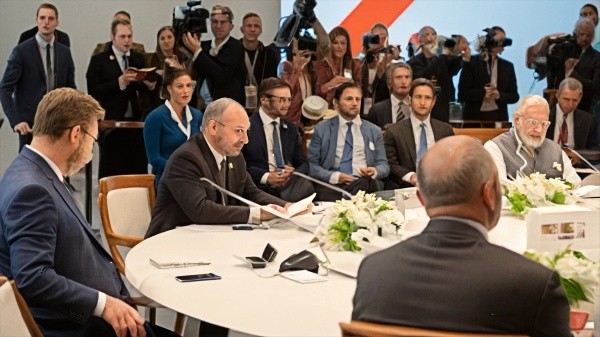Iran’s Plan to Strike Back Against the U.S.
Iran’s Military Preparations Following U.S. Attacks
Loading...

Such measures have a disruptive effect on the world economy and international trade, the group’s joint declaration reads
Introduction
At the recent 16th BRICS Summit held in Kazan, Russia, the member countries of BRICS—Brazil, Russia, India, China, and South Africa—united in a strong condemnation of what they termed "illegal" Western sanctions. The summit culminated in the release of the Kazan Declaration, which emphasizes the detrimental effects of these sanctions on global trade and economic stability.
The Kazan Declaration: Key Highlights
The Kazan Declaration, a comprehensive 33-page document, articulates the group's collective stance against unilateral sanctions that are politically motivated. The declaration states, “We are deeply concerned about the disruptive effect of unlawful unilateral coercive measures, including illegal sanctions, on the world economy, international trade, and the achievement of the sustainable development goals.” This statement underscores the BRICS nations' commitment to fostering a more equitable global economic environment.
The declaration further critiques these sanctions for being inconsistent with World Trade Organization (WTO) rules and for undermining the principles of the United Nations Charter. It highlights that such measures not only hinder economic growth but also exacerbate issues related to energy, health, and food security, ultimately deepening poverty and environmental challenges.
Human Rights Implications
A significant aspect of the declaration is its focus on human rights. The BRICS nations argue that unilateral sanctions disproportionately affect vulnerable populations, undermining their right to development. The declaration calls for the elimination of these coercive measures, emphasizing that they have far-reaching implications for the human rights of individuals in targeted states.
Strengthening Economic Ties Amid Sanctions
Despite facing unprecedented sanctions from Western nations, particularly against Russia, BRICS countries have been actively working to strengthen their economic ties. The United States and its allies have imposed a record number of sanctions on Russia, freezing approximately $300 billion in Russian state assets and targeting various sectors, including energy and finance. In response, Russia has condemned these sanctions as illegal and has implemented countermeasures, including travel bans on Western officials.
Interestingly, some Western politicians and diplomats have begun to acknowledge the ineffectiveness of these sanctions, suggesting that the potential for further restrictions is diminishing. This acknowledgment may signal a shift in the global perception of the efficacy of sanctions as a tool of foreign policy.
A Unified Front for Multilateralism
The BRICS nations are advocating for a multilateral approach to global governance, aiming to create a more balanced world order that reflects the interests of emerging economies. The Kazan Declaration is a testament to their commitment to multilateralism, as it seeks to address the challenges posed by unilateral sanctions and promote cooperation among nations.
As BRICS continues to expand its membership and influence, it positions itself as a counterweight to Western dominance in global affairs. The group's efforts to deepen economic cooperation among its members could pave the way for a more inclusive and representative international system.
Conclusion
The BRICS Summit in Kazan has reaffirmed the group's collective opposition to Western sanctions, framing them as a significant barrier to global economic stability and development. By calling for the elimination of these measures, BRICS is not only advocating for its member states but also championing a broader vision of multilateralism that seeks to empower developing nations. As the geopolitical landscape evolves, the BRICS nations are poised to play a crucial role in shaping a new world order that prioritizes cooperation over coercion.
Editor
Iran’s Military Preparations Following U.S. Attacks
Troops remain in five strategic locations, raising fears of renewed tensions and long-term occupation.
Opposition forces have taken control of the capital after a significant offensive. Here is how it unravelled.
